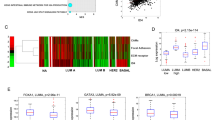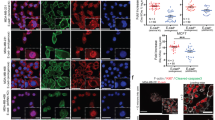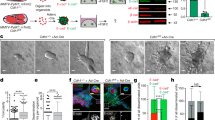Abstract
N-cadherin is a cell–cell adhesion molecule that plays a role in breast cancer metastasis. Here, we show that in vivo expression of N-cadherin in the PyMT mouse model, which enhances mammary tumor metastasis, results in selective inhibition of Akt3 expression and phosphorylation. Similarly, exogenous expression of N-cadherin in PyMT or MCF-7 mammary tumor cells enhanced cell motility and caused a dramatic reduction in Akt3 expression and phosphorylation. Moreover, knockdown of Akt3 in PyMT tumor cells increased cell motility and disrupted mammary morphogenesis, but had no effect on cell proliferation. Conversely, overexpression of wild-type Akt3 in PyMT-N-cadherin cells inhibited cell motility promoted by N-cadherin. Taken altogether, these findings demonstrate that N-cadherin suppresses Akt3 to promote cell motility and highlight the intricate regulation of Akt isoforms by N-cadherin during metastasis.
This is a preview of subscription content, access via your institution
Access options
Subscribe to this journal
Receive 50 print issues and online access
$259.00 per year
only $5.18 per issue
Buy this article
- Purchase on Springer Link
- Instant access to full article PDF
Prices may be subject to local taxes which are calculated during checkout







Similar content being viewed by others
References
Chambers AF, Groom AC, MacDonald IC . Dissemination and growth of cancer cells in metastatic sites. Nat Rev Cancer 2002; 2: 563–572.
Wheelock MJ, Johnson KR . Cadherins as modulators of cellular phenotype. Annu Rev Cell Dev Biol 2003; 19: 207–235.
Wheelock MJ, Johnson KR . Cadherin-mediated cellular signaling. Curr Opin Cell Biol 2003; 15: 509–514.
Cavallaro U . N-cadherin as an invasion promoter: a novel target for antitumor therapy? Curr Opin Investig Drugs 2004; 5: 1274–1278.
Hazan RB, Kang L, Whooley BP, Borgen PI . N-cadherin promotes adhesion between invasive breast cancer cells and the stroma. Cell Adhes Commun 1997; 4: 399–411.
Nagi C, Guttman M, Jaffer S, Qiao R, Keren R, Triana A et al. N-cadherin expression in breast cancer: correlation with an aggressive histologic variant--invasive micropapillary carcinoma. Breast Cancer Res Treat 2005; 94: 225–235.
Nieman MT, Prudoff RS, Johnson KR, Wheelock MJ . N-cadherin promotes motility in human breast cancer cells regardless of their E-cadherin expression. J Cell Biol 1999; 147: 631–644.
Hazan RB, Phillips GR, Qiao RF, Norton L, Aaronson SA . Exogenous expression of N-cadherin in breast cancer cells induces cell migration, invasion, and metastasis. J Cell Biol 2000; 148: 779–790.
Suyama K, Shapiro I, Guttman M, Hazan RB . A signaling pathway leading to metastasis is controlled by N-cadherin and the FGF receptor. Cancer Cell 2002; 2: 301–314.
Hulit J, Suyama K, Chung S, Keren R, Agiostratidou G, Shan W et al. N-cadherin signaling potentiates mammary tumor metastasis via enhanced extracellular signal-regulated kinase activation. Cancer Res 2007; 67: 3106–3116.
Chin YR, Toker A . Function of Akt/PKB signaling to cell motility, invasion and the tumor stroma in cancer. Cell Signal 2009; 21: 470–476.
Dillon RL, Muller WJ . Distinct biological roles for the Akt family in mammary tumor progression. Cancer Res 2010; 70: 4260–4264.
Irie HY, Pearline RV, Grueneberg D, Hsia M, Ravichandran P, Kothari N et al. Distinct roles of Akt1 and Akt2 in regulating cell migration and epithelial-mesenchymal transition. J Cell Biol 2005; 171: 1023–1034.
Iliopoulos D, Polytarchou C, Hatziapostolou M, Kottakis F, Maroulakou IG, Struhl K et al. MicroRNAs differentially regulated by Akt isoforms control EMT and stem cell renewal in cancer cells. Sci Signal 2009; 2: ra62.
Bellacosa A, Kumar CC, Di Cristofano A, Testa JR . Activation of AKT kinases in cancer: implications for therapeutic targeting. Adv Cancer Res 2005; 94: 29–86.
Agiostratidou G, Li M, Suyama K, Badano I, Keren R, Chung S et al. Loss of retinal cadherin facilitates mammary tumor progression and metastasis. Cancer Res 2009; 69: 5030–5038.
Mohammadi M, Froum S, Hamby JM, Schroeder MC, Panek RL, Lu GH et al. Crystal structure of an angiogenesis inhibitor bound to the FGF receptor tyrosine kinase domain. EMBO J 1998; 17: 5896–5904.
Kouhara H, Hadari YR, Spivak-Kroizman T, Schilling J, Bar-Sagi D, Lax I et al. A lipid-anchored Grb2-binding protein that links FGF-receptor activation to the Ras/MAPK signaling pathway. Cell 1997; 89: 693–702.
Roccaro AM, Sacco A, Thompson B, Leleu X, Azab AK, Azab F et al. MicroRNAs 15a and 16 regulate tumor proliferation in multiple myeloma. Blood 2009; 113: 6669–6680.
Nogueira C, Kim KH, Sung H, Paraiso KH, Dannenberg JH, Bosenberg M et al. Cooperative interactions of PTEN deficiency and RAS activation in melanoma metastasis. Oncogene 2010; 29: 6222–6232.
Toker A, Yoeli-Lerner M . Akt signaling and cancer: surviving but not moving on. Cancer Res 2006; 66: 3963–3966.
Brognard J, Sierecki E, Gao T, Newton AC . PHLPP and a second isoform, PHLPP2, differentially attenuate the amplitude of Akt signaling by regulating distinct Akt isoforms. Mol Cell 2007; 25: 917–931.
Chin YR, Toker A . The actin-bundling protein palladin is an Akt1-specific substrate that regulates breast cancer cell migration. Mol Cell 2010; 38: 333–344.
Maroulakou IG, Oemler W, Naber SP, Tsichlis PN . Akt1 ablation inhibits, whereas Akt2 ablation accelerates, the development of mammary adenocarcinomas in mouse mammary tumor virus (MMTV)-ErbB2/neu and MMTV-polyoma middle T transgenic mice. Cancer Res 2007; 67: 167–177.
Guy CT, Cardiff RD, Muller WJ . Induction of mammary tumors by expression of polyomavirus middle T oncogene: a transgenic mouse model for metastatic disease. Mol Cell Biol 1992; 12: 954–961.
Agiostratidou G, Hulit J, Phillips GR, Hazan RB . Differential cadherin expression: potential markers for epithelial to mesenchymal transformation during tumor progression. J Mammary Gland Biol Neoplasia 2007; 12: 127–133.
Debnath J, Walker SJ, Brugge JS . Akt activation disrupts mammary acinar architecture and enhances proliferation in an mTOR-dependent manner. J Cell Biol 2003; 163: 315–326.
Acknowledgements
This study was supported by grants from National Cancer Institute (Grant 1R01 CA135061-01A1) the NIH and Breast Cancer Research Foundation (to RB Hazan). Su Chung was partly supported by the Training Program in Cellular and Molecular Biology and Genetics (T32 GM007491).
Author information
Authors and Affiliations
Corresponding author
Ethics declarations
Competing interests
The authors declare no conflict of interest.
Additional information
Supplementary Information accompanies the paper on the Oncogene website
Rights and permissions
About this article
Cite this article
Chung, S., Yao, J., Suyama, K. et al. N-cadherin regulates mammary tumor cell migration through Akt3 suppression. Oncogene 32, 422–430 (2013). https://doi.org/10.1038/onc.2012.65
Received:
Revised:
Accepted:
Published:
Issue Date:
DOI: https://doi.org/10.1038/onc.2012.65
Keywords
This article is cited by
-
Analysis of connexin 43, connexin 45 and N-cadherin in the human sertoli cell line FS1 and the human seminoma-like cell line TCam-2 in comparison with human testicular biopsies
BMC Cancer (2023)
-
Metastasis suppressor genes in clinical practice: are they druggable?
Cancer and Metastasis Reviews (2023)
-
Targeting Akt in cancer for precision therapy
Journal of Hematology & Oncology (2021)
-
Nanomicelles potentiate histone deacetylase inhibitor efficacy in vitro
Cancer Nanotechnology (2020)
-
Mitochondrial autoimmunity and MNRR1 in breast carcinogenesis
BMC Cancer (2019)



